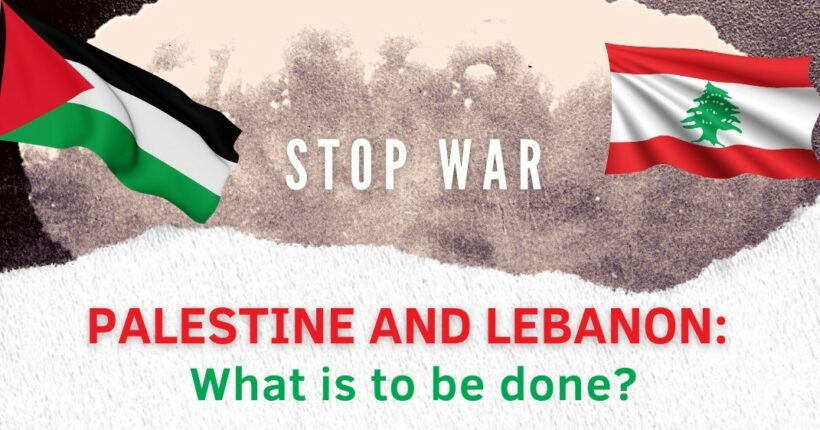On September 13th, the Women’s International League for Peace & Freedom (WILPF) hosted a webinar under the title “Palestine and Lebanon: What is to be done?” Speakers from WILPF’s sections in Palestine, Lebanon, Norway, and the US discussed the situation in Palestine and Lebanon and US foreign policy towards the region. They explored, through a feminist lens, the root-causes of the ongoing crises, what’s to be done to build peace, and why and how US foreign policy towards the region must change. Above all, they expressed their solidarity with the people in Palestine and Lebanon. Language interpretation was provided during the webinar and thus its content was available in English and Arabic. George Friday of Black Liberation Caucus (BLC) and Barbara Taft of WILPF US Middle East Peace and Justice Action Committee (MEPJAC), were the event’s moderators.
After playing a video where Israeli Jews were asked to share their opinion on Arabs and whom they perceive mostly as terrorists, Hanan Awwad, WILPF’s Regional Representative for the Middle East and North Africa (MENA) region and President of WILPF Palestine, talked about the characteristics of the ongoing occupation in Palestine and how it affects the lives of the Palestinian people, who live in fear, endure intolerable circumstances, are at risk of losing their identity, and whose rights are violated. “Where is the peace? Where is the International Law? Where is the voice of humanity?” she wonders.
When Hanan Awwad ended her speech, Hala Kilani of WILPF Lebanon took the floor and described the current situation in Lebanon, a vulnerable and unsteady country which faces multiple crises. “Since October 2019, the country has been facing economic and social collapse,” she commented. “In Lebanon we are exposed to corruption and international financial crimes. We need justice. The corrupt politicians with bank accounts and businesses in the US and other western countries need to be held accountable for their crimes”, she added. Alongside corruption, COVID-19, the devastating explosion in the port of Beirut on August 4th, 2020, the Syrian refugee crisis, and the war in Ukraine from which Lebanon used to import 80% of its wheat have paralyzed Lebanon’s economy and public sector. Hala Kilani referred also to the injustice and social exclusion Lebanese women experience, and how they inspired and shaped the direction and character of the revolution in 2019 and have been since at the forefront of the movement.
Solfrid Raknes of WILPF Norway reflected on how peace can be created and presented “Happy Helping Hand“, a social and emotional learning app for adolescents that can help them confront difficult situations and traumatic experiences, such as displacement. “By playing through engaging scenarios on the app, the adolescents can learn in a safe and fun way how to express their opinions and feelings and deal with negative thoughts, anxiety, bad memories, depression, bullying, and racism,” she explained. Finally, she shared some of the comments that the adolescents who used the app made. They acknowledged the positive impact it had on them, as they became more confident, better problem solvers, and were able to understand not only how to cope better with stress but that they aren’t the only ones struggling as well. Raknes emphasized that we should invest in mental health for young people, because “today’s youth is tomorrow’s leaders and peacebuilders”.
Afterwards, Barbara Taft welcomed Luci Murphy of WILPF US, DMV Branch, and Black Liberation Caucus (BLC), a political activist and musician, and played the song “Palestine“, performed by her.
After the song, Nada Farhat, a human rights activist and member of WILPF US, delved into the deteriorating economic situation of Lebanon and its political system, state’s collapse, insecurity, and corruption, and the long-term practices of powerful western countries that have a tremendous impact on the region and people’s lives. She also shared her thoughts on the upcoming presidential elections and stressed that “the next 6 weeks will dictate the next years in Lebanon.” Finally, she concluded that “if we want to lead a transformation in the region, we have to look both at Palestine and Lebanon and implement a new strategy; this is a challenge we have to face”.
Luci Murphy then described how Palestinian Arabs and Israeli Jews are portrayed by the US media; the latter as allies and the former as terrorists. Based on the memories from her visit to Palestine, she explained how Palestinians’ longstanding connection to their land, their families and their communities is destroyed. For example, hundreds of olive trees Palestinians had planted many years ago were uprooted by the Israeli armed forces. She ended her speech by saying that “like Palestinians, black communities also suffer from dislocation and invisibility” and, quoting Martin Luther King, “injustice anywhere is a threat to justice everywhere”.
In the Q & A Section, the speakers had the opportunity to explain in greater detail some of their earlier comments about the current situation in Palestine and Lebanon. Kilani stressed that “the solution is to pressure the countries financing Israel to stop sponsoring crimes against humanity”, while Awwad mentioned that “Palestinians have gotten to that point where enough is enough. We live in a dangerous situation where we don’t know how tomorrow will be. We have lost hope in the US and the big powers that stand firm with Israel. Although there are some Jewish groups that fight for justice for Palestine, they don’t have much power. We have to try more and become a true voice that supports Palestine. Also, we have to think at the same time about other areas in conflict.”
At the end of the webinar, George Friday thanked the speakers and those who attended and concluded: “We don’t know all that is to be done, but we know we have to do something; push the International and Criminal Law; show that we don’t agree with US policies; be consistent and loud. There are many dangers, but there are solutions as well.”






